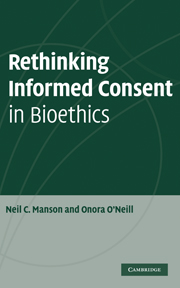Book contents
- Frontmatter
- Contents
- Preface
- Acknowledgements
- 1 Consent: Nuremberg, Helsinki and beyond
- 2 Information and communication: the drift from agency
- 3 Informing and communicating: back to agency
- 4 How to rethink informed consent
- 5 Informational privacy and data protection
- 6 Genetic information and genetic exceptionalism
- 7 Trust, accountability and transparency
- Some conclusions and proposals
- Bibliography
- Institutional sources and documents
- Index
5 - Informational privacy and data protection
Published online by Cambridge University Press: 05 June 2012
- Frontmatter
- Contents
- Preface
- Acknowledgements
- 1 Consent: Nuremberg, Helsinki and beyond
- 2 Information and communication: the drift from agency
- 3 Informing and communicating: back to agency
- 4 How to rethink informed consent
- 5 Informational privacy and data protection
- 6 Genetic information and genetic exceptionalism
- 7 Trust, accountability and transparency
- Some conclusions and proposals
- Bibliography
- Institutional sources and documents
- Index
Summary
We began rethinking informed consent by arguing that it is best viewed as a distinctive kind of communicative transaction, which agents may use to waive ethical and legal requirements in specific ways. For example, consent procedures can be used to waive norms that prohibit invasive action, thereby permitting medical treatment and research participation. Without ways of setting aside general prohibitions on invasive action, both medical treatment and research would be severely restricted. Patients would go without care; medical research would generally be impossible.
In this chapter we turn to the ways in which informed consent can be used to waive prohibitions on action that would otherwise be intrusive rather than invasive. Where invasive action violates either others' bodily integrity (it may force or restrain, injure or harm, even mutilate, poison or kill), or their liberty or property (it may threaten, enter, steal, damage or destroy property), intrusive action, by contrast, infringes a specific range of liberty rights, often referred to as privacy rights. There are many conceptions of privacy, and of privacy rights. For example, in the US discussions of privacy rights are often viewed very broadly as encompassing the liberty rights that protect individuals against invasive action, and have classically been seen as elements of a ‘right to be let alone’. In public debate in the UK privacy is typically understood in a more restricted way, as a right against action that is intrusive, but may not be invasive (consequently many of the actions characterised as invasions of privacy in US debates are seen in Millian terms as violations of liberty rather than of privacy in the UK).
- Type
- Chapter
- Information
- Rethinking Informed Consent in Bioethics , pp. 97 - 129Publisher: Cambridge University PressPrint publication year: 2007



